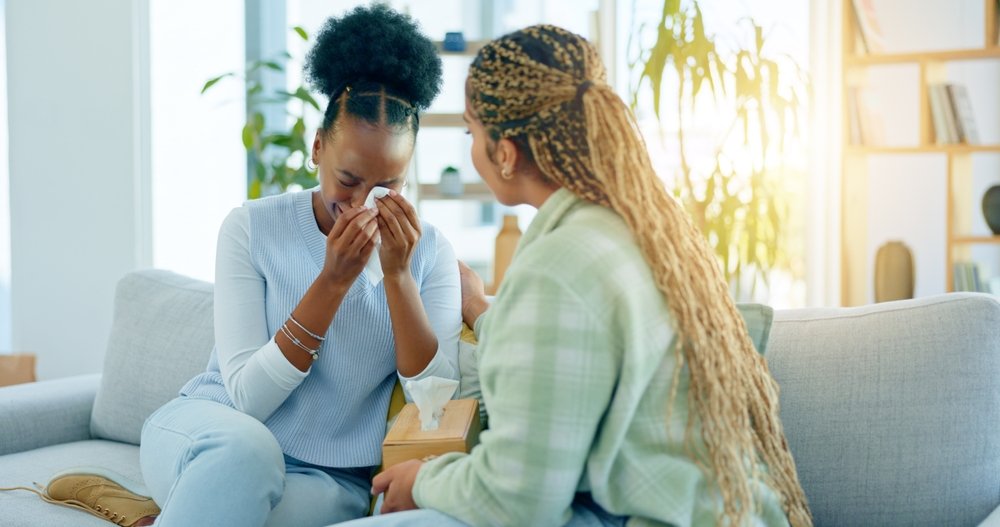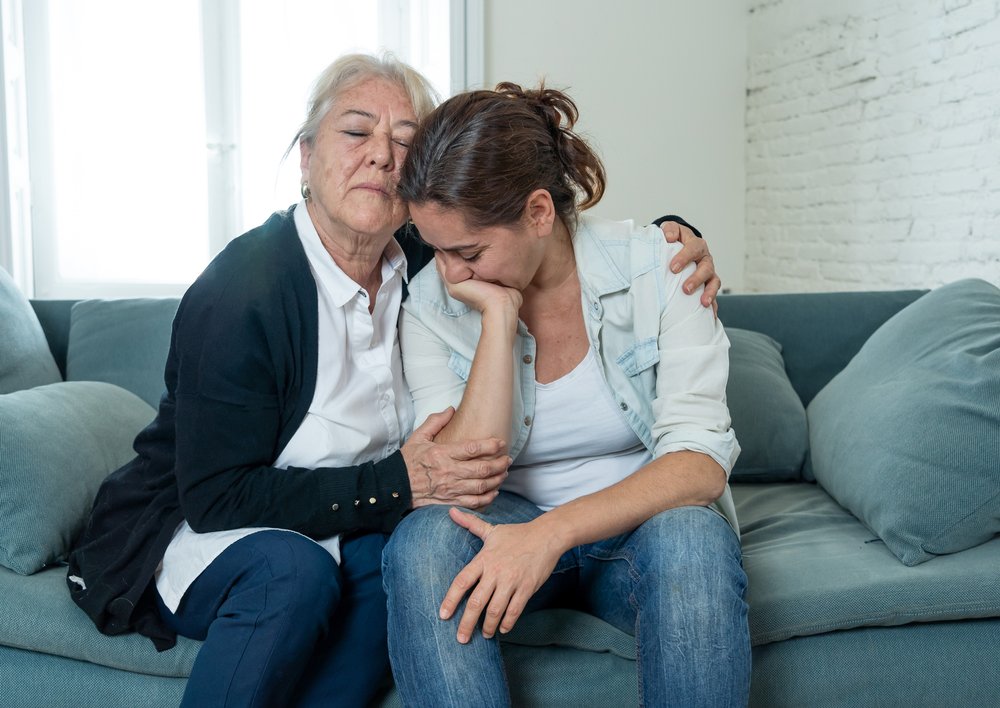The Pain of Losing a Best Friend
"I never experienced such immense pain in my life." Valeria reflects on finding out about when her best friend, Spencer, passed away from fentanyl poisoning.
What is Grief?
Grief is a natural response to loss. It’s the emotional suffering you feel when someone or something you love is taken away. While we most often associate grief with the loss of a loved one, we can also experience grief from the loss of connections, places, and things that we feel define us and connect to how we see ourselves.
Grief is complex and no two people experience it in the same way, to the same degree, or on the same timeline. The pain of loss can feel overwhelming, but understanding grief can help you navigate through it. (3)
You may grieve the loss of:
A relationship: friend, pet, partner, family member
Places: Your home, neighborhood, or community
Culture
Your job or career
Financial stability
A dream or goal
Health
Your youth (4)
Grief is a natural response to loss.
What Are the Stages of Grief?
These are the common stages of grief, but how you move through them will be very individual – some people will experience them all, in order. Others may only experience some of the stages, in no particular order.
-
Accepting that your loss is real is difficult: "This isn’t happening." “This is a bad dream.”
-
You may grasp at ways to direct blame and anger at yourself, towards other people, at God, or other sources: "Why is this happening?” “If I had just…this wouldn’t have happened.”
-
You envision reaching a bargain, or agreement, to help alleviate the loss. Or, you may think about past actions or decisions that you imagine would have spared you the loss: "If only I had…." “What if…?”
-
Feelings of sadness, despair, or even numbness that can be mild to debilitating: "I’m too sad to do anything." “I can’t live without…”
-
Accepting the reality of the loss. Acceptance does not mean that you no longer feel the grief. "I’m sad, but can see a path forward." “At least I was able to…”
The American Psychological Association (APA) defines grief as lasting from six months to two years, but every person responds differently to grief and will have a different timeline.
What Are Some of the Types of Grief?
-
Grieving before the actual loss occurs, often experienced in cases of chronic illness or the prospect of children leaving home.
-
Grief that is not socially acknowledged or supported by friends, family, or society such as an instance of the loss of a pet or the loss of a career in the case of retirement. This type of grief can also include loss that is stigmatized like in the case of suicide or substance use. Other types of loss such as those resulting from religious or cultural trauma be diminished or disregarded by others in society, even though they are significant to the individual or group experiencing the grief.
-
Also known as complicated grief, your sadness persists for a long time, sometimes years, and you continue to have difficulty coping as the grief interferes with daily life.
-
Shock or denial can lead to the absence of feeling grief when you experience devastating loss. Likewise, rather than experiencing feelings of grief immediately following a loss, emotions may be delayed for weeks or months. This can be especially true for those who are making arrangements following the death of a loved one.
-
You move through the stages of grief quickly, often because you’ve done much of the emotional work before experiencing the loss. Loss from chronic illness, recent retirement, and losing a very advanced-age parent are some situations that may lead to abbreviated grief.
-
While grief is often felt on a personal level, grief can also be felt collectively, by a group, a community, a nation, or a culture. Shared experiences like mass shootings, wars, natural disasters, and pandemics lead to many people experiencing grief together. Collective grief Sometimes loss can affect a nation, a people, a culture, or the entire world. This community-level form of grief is known as collective grief. (2)
There is no formula for the types of physical and emotional symptoms a person will feel while experiencing grief.
What Are the Symptoms of Grief?
There is no formula for the types of physical and emotional symptoms a person will feel while experiencing grief. Support from friends, family, and professional counselors can be crucial in navigating these symptoms and finding ways to cope with the loss.
Emotional Symptoms
You may feel a range of emotions, and they may even seem to compete with one another – for example, you could very well feel both anger and sadness at the same time. These emotional symptoms are a natural part of the grieving process, and everyone experiences them differently.
Sadness
Anger
Guilt
Anxiety
Loneliness
Despair
Hopelessness
Physical Symptoms
Grief can manifest physically in various ways, often reflecting the intense emotional and psychological stress experienced. Seeking medical advice is important if symptoms persist or are severe.
Fatigue
Changes in Appetite
Sleep Disturbances
Aches and Pains
Digestive Issues
Weakened Immune System
Tightness in the Chest
Shortness of Breath
Heart Palpitations
Weight Changes
Dizziness
Muscle Weakness
Behavioral Symptoms
Grief can significantly impact behavior, leading to noticeable changes in how a person acts and interacts with the world around them.
Social Withdrawal
Crying
Restlessness
Neglecting daily responsibilities (work and personal)
Difficulty maintaining routines
Changes in Activity Levels
Sleep Disturbances
Changes in appetite
Substance Use
Coping with grief involves finding healthy ways to manage the intense emotions and adjustments that come with loss.
Coping with Grief
The American Psychological Association (APA) defines grief as lasting from six months to two years, but every person responds differently to grief and will have a different timeline. Most often, people begin to find relief from symptoms as time passes. Coping with grief involves finding healthy ways to manage the intense emotions and adjustments that come with loss.
Allow Yourself to Grieve
Permit yourself to feel sad, angry, or whatever emotions rise to the surface.
Understand that grief is a process and everyone experiences it differently.
Recognize that healing takes time and there’s no “right” way to grieve.
Allow yourself to move through the stages of grief at your own pace.
Seek Support & Connection
Talk to friends and family about your feelings.
Join a support group for people who are also grieving.
Consider professional help from a therapist or counselor specializing in grief.
Acknowledge & Express Your Emotions
Write in a journal about your thoughts and feelings.
Create art or music, or engage in other creative outlets.
Avoid holding in the emotion – cry and vent when you need to.
Maintain Routine
Keep up with daily routines to provide a sense of normalcy.
Set small, manageable goals for each day.
Practice Self-Care
Eat a balanced diet and stay hydrated.
Exercise regularly, even if it’s just a short walk.
Ensure you’re getting enough sleep.
Engage in hobbies and activities that bring you joy.
Avoid Unhealthy Coping Mechanisms
Limit alcohol and avoid using drugs to numb the pain.
Be mindful of any tendencies to withdraw from loved ones excessively.
Honor Your Loss
Create a memorial or engage in activities that remind you of your loved one.
Celebrate their life through shared stories, photos, or rituals.
Debra Kissen. (2017, September 19). How to prevent trauma from becoming PTSD. Anxiety and Depression Association of America, ADAA. https://adaa.org/learn-from-us/from-the-experts/blog-posts/consumer/how-prevent-trauma-becoming-ptsd
Gillette, H. (2022, December 19). 9 Different Types of Grief. Psych Central. https://psychcentral.com/health/types-of-grief#prolonged
Grief. American Psychological Association. (2024). https://www.apa.org/topics/grief
Grief. Cleveland Clinic. (2023a, February 22). https://my.clevelandclinic.org/health/diseases/24787-grief
Mayo Foundation for Medical Education and Research. (2022, December 13). Post-traumatic stress disorder (PTSD). Mayo Clinic. https://www.mayoclinic.org/diseases-conditions/post-traumatic-stress-disorder/symptoms-causes/syc-20355967
PTSD (post-traumatic stress disorder): Symptoms & treatment. Cleveland Clinic. (2023b, October 6). https://my.clevelandclinic.org/health/diseases/9545-post-traumatic-stress-disorder-ptsd












